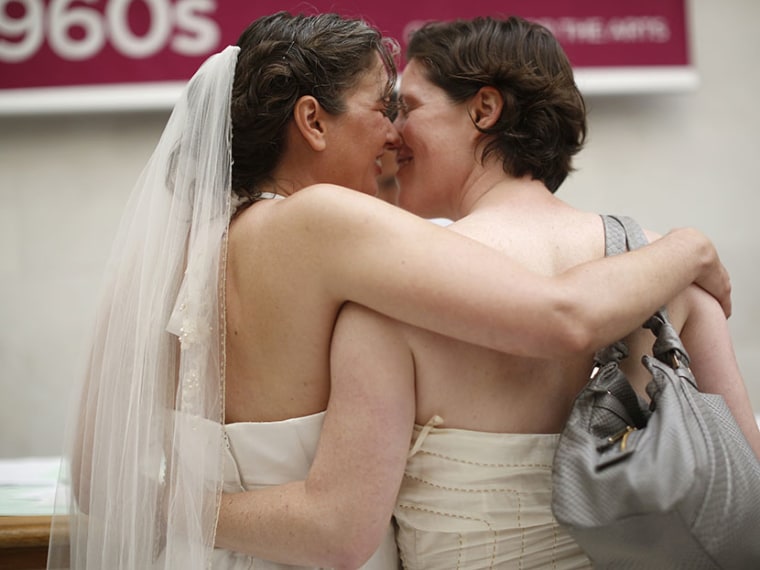The days of same-sex marriage bans may be coming to an end.
In the first federal lawsuit filed anywhere in the country since the Supreme Court handed down decisions in two landmark marriage equality cases, the American Civil Liberties Union, the ACLU of Pennsylvania, and volunteer counsel from a Philadelphia-based law firm on Tuesday formally challenged Pennsylvania's law prohibiting same-sex couples from marrying.
Like the Defense of Marriage Act, which the Supreme Court struck down two weeks ago, Pennsylvania’s statutory provision limits marriage to unions between one man and one woman, and prevents the state government from recognizing same-sex marriages performed where they are legal. The suit alleges that Pennsylvania’s law violates the fundamental right to marry, as well as the Equal Protection Clause of the Fourteenth Amendment.
“We only want what every married couple wants--to express our love and commitment in front of friends and family, and the security and protections that only marriage provides,” said Deb Whitewood, one of the 23 plaintiffs challenging the Pennsylvania provision, in a statement released by the ACLU. “Our life is built around our relationship and the family we have made,” she said of her partner of 22 years, Susan Whitewood, and their three children, Abbey, Katie, and Landon.
The two women had a "holy union" ceremony at their church in 1993 shortly before they each changed their last names to Whitewood, a combination of their surnames. In 2001, they entered into a civil union in Vermont. Yet Pennsylvania law treats them as “legal strangers,” writes the ACLU.
Currently, Pennsylvania is one of 35 states that prohibits same-sex marriage through a constitutional or statutory provision. But as with national trends, support for marriage equality among Pennsylvanians is on the rise. A recent survey from Public Policy Polling found an almost even split on the issue, with a net 14 point increase over the last year and a half in favor of legalizing gay marriage across the state.
While the main focus of this suit will be on Pennsylvania, it could lead the Supreme Court to rule on whether same-sex couples across the country have the constitutional right to marry--a question the justices declined to answer when they ruled the proponents of Proposition 8, California’s ban on same-sex marriage, lacked standing to defend it.
Should Pennsylvania uphold its ban on same-sex marriage, this suit stands a chance at landing before the nation's highest court.
“It’s pretty clear that the Supreme Court will at some point in the not too distant future want another crack at the issue,” said Witold Walczak, ACLU of Pennsylvania’s legal director, to msnbc. “We have a strong legal case, and I think it could be a good vehicle for the Supreme Court to reconsider whether same-sex couples have a right to marry under the constitution.”
Similar challenges to state bans on same-sex marriage are already underway in Illinois, New Mexico, and Michigan, noted Walczak. The ACLU also announced on Tuesday that it would amend an existing adoption lawsuit in North Carolina to include a challenge to that state’s marriage laws. And James Esseks, director of the ACLU’s Lesbian Gay Bisexual Transgender & AIDS Project, told the Washington Post that a suit against Virginia’s ban on same-sex marriage would come “quite soon.”
“There was a huge amount of excitement and positive energy today,” said Walczak. “Pennsylvania is the birthplace of the constitution and the cradle of liberty, so it’s a fitting place to have a fight over the constitutional right to marry,” he added.
“Now the hard work begins.”
